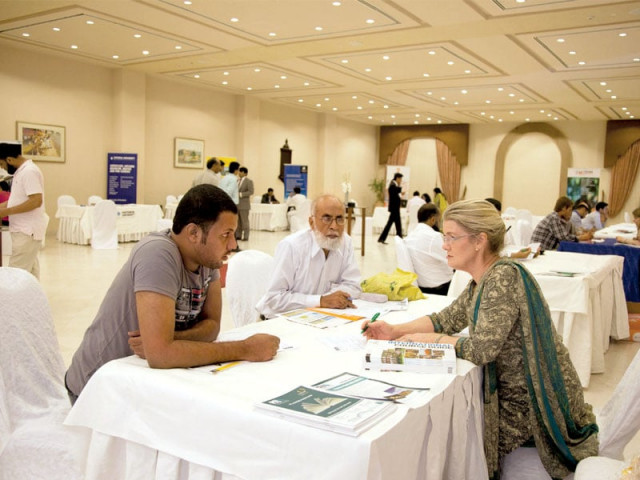Education expo: Without guidance, students pursue studies like lemmings
Investing in a foreign degree without research is expensive, yet extremely prevalent.

Education expo: Without guidance, students pursue studies like lemmings
While prospective university students in Islamabad benefit from education expos arranged by foreign embassies and universities, expos alone cannot fill the hole left by a lack of career and academic guidance in most schools. Students at Saturday’s Australian Education Expo faced a similar dilemma in trying to gain some perspective on their future academic prospects.
University of Canberra representative Beverly Reilly concurred on the need for academic counselling. She stressed on the importance of students thinking through their career plans, rather than rushing into a degree without being certain of their future in that field and if it will lead to satisfactory employment after graduation.
Quite a few students at the expo --- which will be held in Lahore on Sunday and Karachi on Tuesday --- seemed to be suffering from the very pitfalls Reilly addressed.
Sanaullah has done his A’ levels and Sohail is an ICS graduate. Both came to the event with no clear idea of what they want to pursue further, however, guidance counsellors at the event helped them focus on information technology.
“I think information technology would be a good option for me, it’s relevant and should get me an interesting job,” Sohail said, while admitting that it doesn’t really matter what kind of degree one gets as long as it is a foreign degree.
Reilly cautioned against this: “Good students are the ones that are genuinely interested in their subjects and are good at them. If one jumps into a random field, the chances are that they will get bored and disgruntled sooner or later.”
However she also noted that a university education doesn’t only give you academic specific information but also the skill set for practical life, such as analytical tools, self-direction and situation evaluation skills and teamwork.
Israr Hussain’s biggest perceived hurdle in getting a foreign education and visa are the IELTS and TOEFL English proficiency tests. However, the consequences of pursuing an education in a language that one is not proficient in can be very detrimental to a student’s GPA as well as confidence, Reilly noted.
“There are a number of things students can do to improve their English before or after they come to Australia, but preferably it should be before so their grades don’t suffer.” She noted that simple things like listening to cricket commentary on the radio, reading English books and trying to speak with English proficient individuals can greatly improve listening and writing skills.
Lastly, Reilly addressed the large issue of brain drain in developing countries, noting that “students have a right to do what they perceive is best for them at the end of the day and to work where they will be most happy and successful”.
On the flip side, Zaidul Rahman who studied in the UK before joining PFL Education, the event organiser, commented, “I came back to Pakistan after my studies and a few years of working abroad because I couldn’t be truly happy there and had to come back to my roots.”
Published in The Express Tribune, July 29th, 2012.



















COMMENTS
Comments are moderated and generally will be posted if they are on-topic and not abusive.
For more information, please see our Comments FAQ